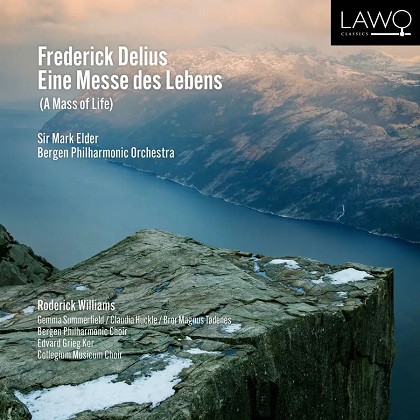‘The status attained by Frederick Delius as a composer ensures for every new work from his pen the respectful attention of all classes of musicians. In the case of a work of the character and proportions of A Mass of Life, great interest was naturally excited in the first performance in England which took place at Queen’s Hall in June 7 under the direction of Mr. Thomas Beecham.’
So read a report in the July edition of the Musical Times in 1909. While virtually no music by Delius had been heard in London between an all–Delius event in 1899 and a performance of his revised Piano Concerto in 1907, the composer’s name had begun to reach new audiences, if largely in Germany. In 1908 Sea Drift was heard at the Sheffield Festival, and soon afterwards In a Summer Garden and the first London outing of Brigg Fair. The premiere of A Mass of Life drew mixed opinions, with the Musical Times taking the composer to task, complaining that ‘Delius is in the forefront of the movement that has of late years altered the character of choral music; but even he fails to reconcile the new ideas with the capabilities of the human voice and the range of musical intelligence of the average choralist’. Yet the work’s vocal demands also drew sympathy from the critic, who suggested the North Staffordshire District Choral Society’s singing ‘often verged on the miraculous’.

In many ways ‘miraculous’ aptly describes the choral singing heard on this recent issue from LAWO released in November 2023. The combined forces of the Bergen Philharmonic Choir, the Edvard Grieg Kor and Collegium Musicum Choir are truly magnificent and stride through the opening choruses of Parts 1 and 2 as to the manor born. Its text, derived from Nietzsche’s Also sprach Zarathustra, is delivered with a breathless fervour, singers seemingly identifying with the notion of man as superman. Delius’s brutal challenges are brushed aside, awkward chromaticisms fearlessly met and stratospheric moments for the unflagging sopranos despatched with aplomb. Sung with exceptional conviction, those opening sections are an infectious joyride. Elsewhere, warmth of tone from the basses nicely underpins the mezzo at ‘O Mensch! Gib Acht!’, and there’s some wonderfully agile singing from the passages for four-part women’s chorus, notably in the frolicsome ‘Dance Song’.
Occupying the lion’s share of the solo allocation is an avuncular-sounding Roderick Williams, whose mahogany tone impishly wraps itself around his paean to laughter, its lilting phrases both buoyant and characterful. There’s no sense of struggle here for a voice that is both easy on the ear and authoritative. His high G, evoking a lover’s soul near the close of ‘The Night Song’, is particularly impressive and his ‘Lyre Song’ is enchanting. Mezzo-soprano Claudia Huckle is ardently expressive in her soliloquy to Zarathustra, soprano Gemma Summerfield brings radiance and a somewhat stolid Bror Magnus Tødenes (tenor) completes the solo team.
The members of the Bergen Philharmonic Orchestra are especially sensitive collaborators, who collectively and variously create numerous ear-catching moments, not least from the woodwind section. The opening of Part 2 enjoys some delightful horn playing and adds considerably to the mystery of Delius’s ‘On the Mountains’ music, while a solo trumpet briefly bursts through the supporting textures to (unintentional) comic effect in ‘The Song of Life’ (CD 1/ track 3 at 6’36”). Oboe, cor anglais and bass oboe beguile as they weave their way through the serenity of ‘At noon in the meadows’ in Part 2. Any sense of nostalgia or wistful resignation (arguably at odds with Nietzsche’s’ free-thinking concept of man’s independence and boundless energy) that might have been ‘wearisome’ to the Musical Times critic in 1909 here is magical in this atmospheric paragraph. And, no matter how slow certain other passages are, there’s always a sense of forward momentum.
Sir Mark Elder, who is the orchestra’s Principal Guest Conductor fashions a life-affirming performance that reconciles Delius the dreamer and Delius the visionary. He also reconciles the problems posed by the work’s lavish scoring (including six horns and four trumpets) and its text-laden vocal writing, rarely losing the clarity of Nietzsche’s enigmatic words. Recorded live from performances in the Grieg Hall, Bergen, in September 2022, this account bears favourable comparisons with existing accounts (Groves, Hickox and Hill), with clear sound (though choral basses somewhat indistinct at times) and informative booklet notes. The only disappointment is the unhelpful layout of the German / English texts. Otherwise, and without hesitation, all true Delians should add this major recording to their collection.
David Truslove
Delius: A Mass of Life
Gemma Summerfield (soprano), Claudia Huckle (mezz-soprano) Bror Magnus Tødenes (tenor), Roderick Williams (baritone), Bergen Philharmonic Choir, Edvard Grieg Kor, Collegium Musicum Choir, Bergen Philharmonic Orchestra, Sir Mark Elder
LAWO Classics: (2 CDs) LWC1265 [94 mins]